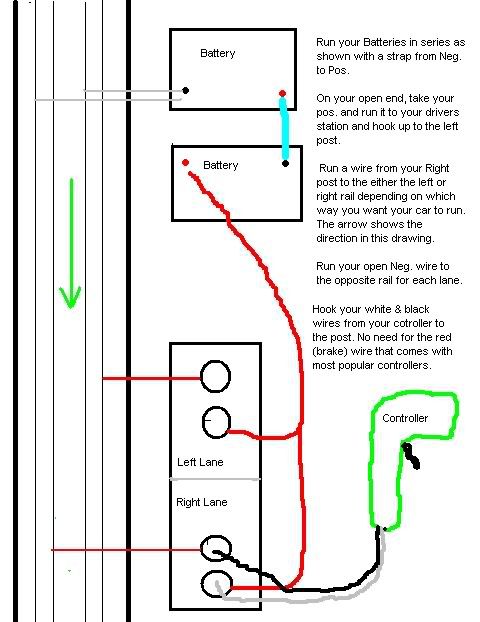|
|
Post by SKR on Sept 12, 2007 7:04:26 GMT -7
Here is a basic drawing of running two batteries in series for power to your track.  |
|
|
|
Post by SKR on Sept 12, 2007 7:26:47 GMT -7
A good way to detect how much your batteries or power supplies are putting out at all times is to get a digital mutimeter. Run it directly off of your pos/neg cables. We keep ours at the starting line reading volts for easy viewing.
|
|
|
|
Post by johnbalich on Dec 4, 2007 14:21:02 GMT -7
hey SKR...I understnad that the type of automotive battery used is important. I believe 'deep cycle' is preferred. Is this your understanding and can you clear it up for us.
|
|
|
|
Post by SKR on Dec 5, 2007 9:36:52 GMT -7
This was posted by Chris (killerskid) in another thread. I'm surprised the old man ("killer") hasn't chimed in with an opinion on the power sources. It’s been awhile since my one required electrical engineering course, but I’ll help the best I can. A common misconception is that voltage is a significantly important variable to be controlled with slot cars. In reality, small differences in voltage won’t affect the total power to the slot car, so long as an adequate amount of current is available. The small electric motor will draw the adequate amount of amperage to offset small changes in voltage. That’s why they can run the same dial-ins all night at Psycho Slots and simultaneously have a small voltage drop. This can be summed up with Joule’s Law: Power = Current X Voltage. Just remember the DC motor only pulls the current it needs. Does the small change in voltage subtly affect HOW the car performs (torque, heat, etc.)? Maybe to some small degree but it is probably a second or more likely a third order affect. The affect is probably about the same as not placing the car in the exact same orientation on the start line, or not having the armature in the exact same position, or not having precisely the same gears meshing. I could go on and on but you get the idea, it’s not measurable. I personally have a preference for batteries over AC/DC power supplies for one main reason: the AC/DC power supply is plugged into the wall. Wall power is not consistent and you have very little control over it. You may think the power company is sending you good power but it can change at any time. AC/DC power supplies combat these changes by using capacitors or some other smoothing feature. Regardless, I think if you did a comparison of a battery power vs. AC/DC power supply over a course of a race, you’d see that battery power is more consistent. You may overcome the difference if you pay a pretty penny ($400+) for very good power supply. Another possible problem is the bleed through of AC heating the motors. However, it shouldn’t be as significant to drag racing as road racing. In the end here’s how I see it. The AC/DC power supply is built to imitate the perfect DC power source (batteries). The AC/DC power supply offers a lower effort alternative to a battery. However, a good AC/DC power supply is expensive. Other lesser AC/DC power supplies may do the job if you buy two. Now you’ve got two power supplies plugged into the same circuit (we’re back to the wall power which I don’t like). Ultimately, you have to judge the tradeoffs for yourself. A few deep cycle batteries plus a good charger will almost always cost less than a comparable AC/DC power supply alternative. Do you perceive the maintenance/charging of deep cycle batteries as burdensome? Some do. Some don’t. Would you rather just plug in the wall and run? Venting batteries shouldn’t be an issue if you don’t overcharge, but it wouldn’t hurt to open a window (I think they even make maintenance free versions which are more expensive). Is the AC/DC power supply you can afford good enough to imitate a consistent DC power source? How long will the batteries last? With good maintenance, some will last many years, with bad maintenance not so much. How long will the AC/DC power supply last? A good power supply will probably last a long time. A bad power supply will become less and less reliable as the heat generated due to the AC/DC conversion tends to cause damage. You can probably judge the quality of the power supply by the warranty offered. Wow, I wrote more than I expected. For me, I would choose batteries because it’s a cheaper and simpler system: fewer variables are involved which I prefer. However, to each their own, a good AC/DC power supply probably isn’t significantly different. Here's an old thread I found as well that may be helpful: groups.google.com/group/alt.hobbies.slotcars/browse_thread/thread/4ef0531e1538ec67/e59eb220e4a8b10c?lnk=st&q= dc+motor+ripple+damage&rnum=2&hl=en# « Last Edit: Sept 17, 2007, 7:21pm by killerskid » |
|
Deleted
Deleted Member
Posts: 0
|
Post by Deleted on Dec 14, 2008 21:00:54 GMT -7
What batteries are you using?
Im having a hard time finding 6VDC auto batteries to get 18VDC..
anybody.... bueller? bueller? bueller?.... ;D
Thanks for your help..
Dan
|
|
|
|
Post by johnbalich on Dec 14, 2008 22:09:59 GMT -7
Golf carts and simliar small vehicles use 6 volt batteries I believe. They also tend to favor deep cycle batteries as well..........deep cycle batteries, as I understand it, are not nearly as finicky about being charged/recharged and discharge/charge cycles.
|
|